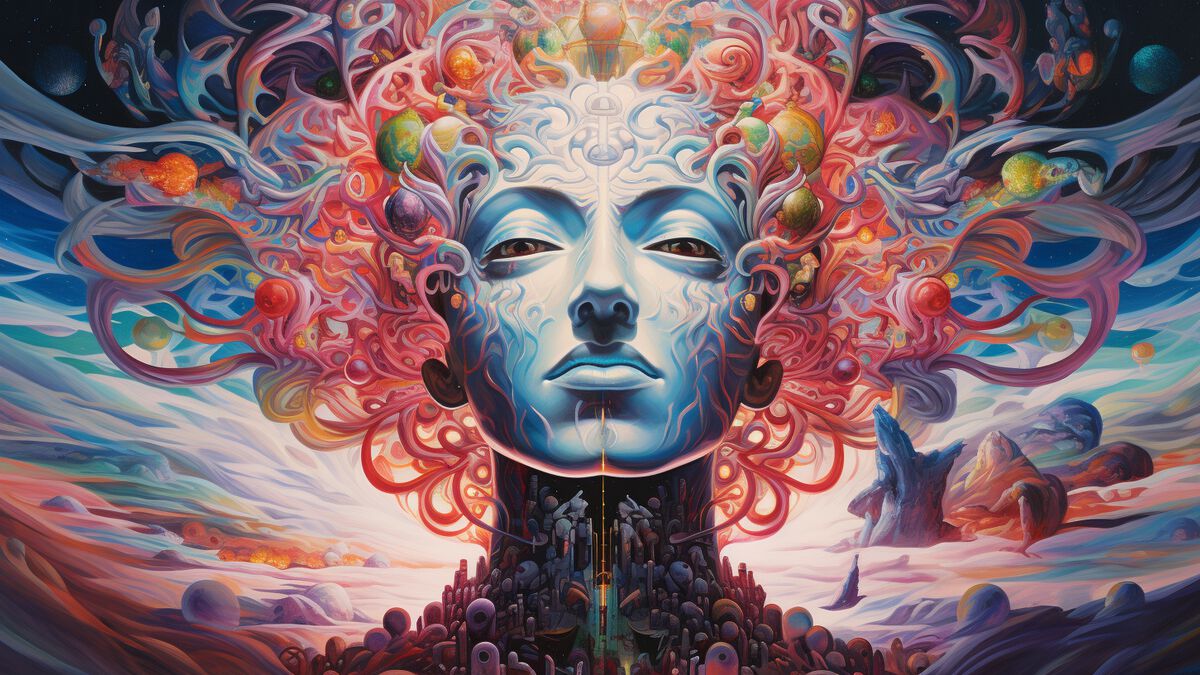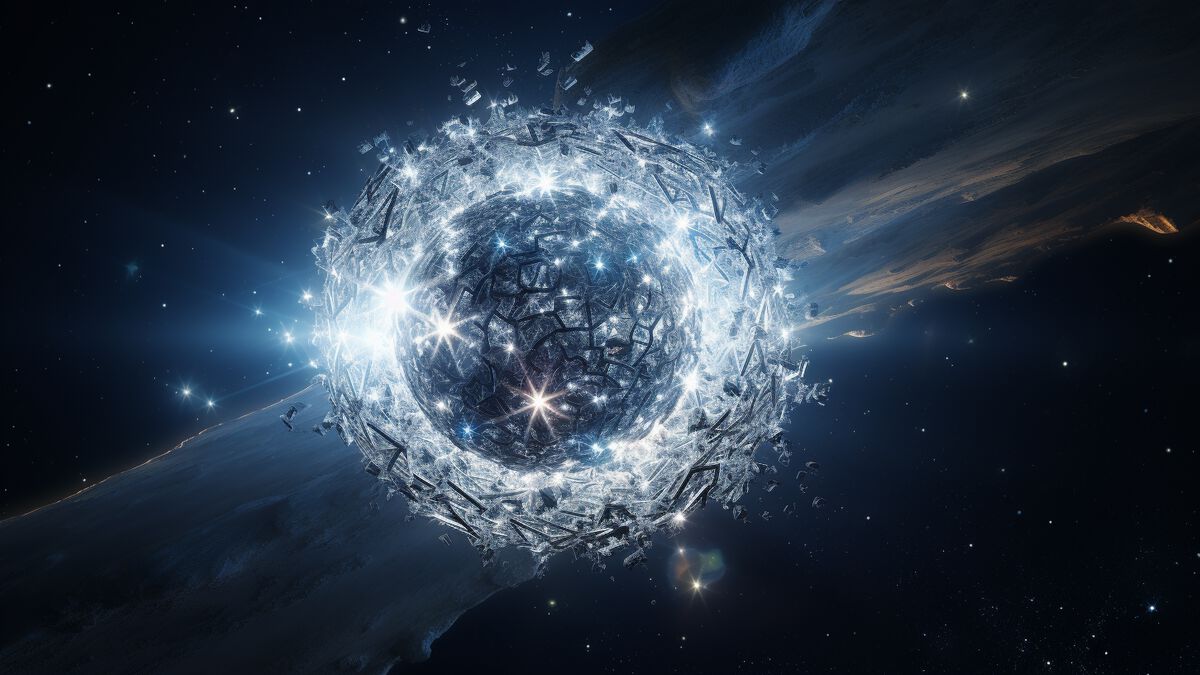Why Are We Not Already Gods?
Lincoln Cannon
2 August 2023 (updated 3 January 2026)
My friend asks “why we are not Gods yet?” Or, to use secular language, why aren’t we already superintelligence? “We have ALL had eternity already to strive, so why ain’t we all the way to the top of tops of tops already?”
My friend’s question arises from reflection on a unique aspect of Mormon metaphysics. It’s the proposition that intelligence is eternal. It was never created. It can never be destroyed.
Eternal Intelligence
The most succinct expression of this idea is found in a revelation, recorded by Joseph Smith, which became the 93rd section of the Doctrine and Covenants. Here’s the 29th verse of the section:
“Man was also in the beginning with God. Intelligence, or the light of truth, was not created or made, neither indeed can be.”
The basic idea here is that God didn’t create, in some sense of the word, intelligence. I stress “in some sense of the word” for reasons that I’ll clarify later. But again, basically, intelligence has always existed in some form or another for as long as God has existed. And, depending on how one interprets other aspects of Mormon metaphysics, that timeline is at least extremely long, if not infinite or indefinite.
Joseph also elaborated on this idea in his last general conference sermon, commonly known as the “King Follett” sermon. Here’s the most relevant part:
“I have another subject to dwell upon, which is calculated to exalt man; but it is impossible for me to say much on this subject. I shall therefore just touch upon it, for time will not permit me to say all. It is associated with the subject of the resurrection of the dead, namely, the soul – the mind of man – the immortal spirit. Where did it come from? All learned men and doctors of divinity say that God created it in the beginning; but it is not so: the very idea lessens man in my estimation. I do not believe the doctrine; I know better. Hear it, all ye ends of the world; for God has told me so; and if you don’t believe me, it will not make the truth without effect. I will make a man appear a fool before I get through; if he does not believe it. I am going to tell of things more noble.
“We say that God himself is a self-existent being. Who told you so? It is correct enough; but how did it get into you heads? Who told you that man did not exist in like manner upon the same principles? Man does exist upon the same principles. God made a tabernacle and put a spirit into it, and it became a living soul. How does it read in the Hebrew? It does not say in the Hebrew that God created the spirit of man. It says, ‘God made man out of the earth and put into him Adam’s spirit, and so became a living body.’
“The mind or the intelligence which man possesses is co-equal with God himself. I know that my testimony is true; hence, when I talk to these mourners, what have they lost? Their relatives and friends are only separated from their bodies for a short season: their spirits which existed with God have left the tabernacle of clay only for a little moment, as it were; and they now exist in a place where they converse together the same as we do on the earth.
“I am dwelling on the immortality of the spirit of man. Is it logical to say that the intelligence of spirits is immortal, and yet that it had a beginning? The intelligence of spirits had not beginning, neither will it have an end. That is good logic. That which has a beginning may have an end. There never was a time when there were not spirits; for they are co-equal with our Father in heaven.
“I want to reason more on the spirit of man; for I am dwelling on the body and spirit of man – on the subject of the dead. I take my ring from my finger and liken it unto the mind of man – the immortal part, because it has no beginning. Suppose you cut it in two; then it has a beginning and an end; but join it again, and it continues one eternal round. So with the spirit of man. As the Lord liveth, if it had a beginning, it will have an end. All the fools and learned and wise men from the beginning of creation, who say that the spirit of man had a beginning, prove that it must have an end; and if that doctrine is true, then the doctrine of annihilation would be true. But if I am right, I might with boldness proclaim from the house-tops that God never had the power to create the spirit of man at all. God himself could not create himself.
“Intelligence is eternal and exists upon a self-existent principle. It is a spirit from age to age, and there is no creation about it. All the minds and spirits that God ever sent into the world are susceptible of enlargement.”
I want to call your attention to a couple implications of Joseph’s words.
Intelligent Minds
First, Joseph suggests a subtle distinction between minds and intelligence. When not reading the text closely, it may appear that he simply equivocated between “soul,” “mind,” “spirit,” and “intelligence.” And I think he did generally equivocate between “mind” and “spirit.” But I don’t think he intended an equivocation with “soul” or “intelligence.”
For example, the Book of Mormon explicitly defines “soul” as the combination of body and spirit – body and mind together, rather than just mind. And, in the quoted passage above, Joseph repeatedly used the phrase, “intelligence of spirits,” which seems to suggest that intelligence is an attribute of spirits – intelligence is something that minds have.
So, at least for Joseph, minds and intelligence aren’t necessarily the same thing. And, beyond Joseph’s words, there are practical reasons to distinguish between concepts of intelligence and consciousness.
Changing Minds
Second, Joseph suggests that minds can change. Although intelligence has no beginning or end, and thus the minds it composes have always existed to some extent and in some form, minds are nonetheless “susceptible of enlargement.” Minds can become more intelligent. Here’s another expression of that idea from Joseph, in Doctrine and Covenants 130:
“Whatever principle of intelligence we attain unto in this life, it will rise with us in the resurrection.
“And if a person gains more knowledge and intelligence in this life through his diligence and obedience than another, he will have so much the advantage in the world to come.”
Joseph also believed that minds can change not only for the better, or “enlargement,” but also for the worse. In other words, minds can lose intelligence. He expressed this in a revelation that became Doctrine and Covenants 93:
“The glory of God is intelligence, or, in other words, light and truth. …
“And that wicked one cometh and taketh away light and truth, through disobedience, from the children of men, and because of the tradition of their fathers.”
Eternal Matter
Intelligence isn’t the only thing to which Joseph attributed eternal existence. Matter is also eternal. Here are his words:
“You ask the learned doctors why they say the world was made out of nothing; and they will answer, ‘Doesn’t the Bible say He created the world?’ And they infer, from the word create, that it must have been made out of nothing. Now, the word ‘create’ came from the ‘baurau’ which does not mean to create out of nothing; it means to organize; the same as a man would organize materials and build a ship. Hence, we infer that God had materials to organize the world out of chaos – chaotic matter, which is element, and in which dwells all the glory. Element had an existence from the time he had. The pure principles of element are principles which can never be destroyed; they may be organized and re-organized, but not destroyed. They had no beginning, and can have no end.”
In other words, as intelligence is eternal, so matter or element is eternal. As intelligence wasn’t created, in some sense of the word, neither was matter created in that sense. But matter can be “organized and re-organized,” which entails both creation and destruction in other senses of these words.
Created Minds
There are, of course, various opinions on how best to interpret Joseph’s words on the eternal nature of matter and intelligence. In my opinion, the best interpretations recognize and leverage the parallels that Joseph suggested between them. From that perspective, neither matter nor intelligence can be created from nothing or entirely annihilated. But both matter and intelligence can be organized and disorganized, and therefore created and destroyed in other senses of these words.
The results of such creation-by-organization are bodies of various types and degrees. Matter is organized into course bodies. Likewise, intelligence is organized into subtle bodies – or minds. As bodies are created through the organization of matter, minds are created through the organization of intelligence.
Material Minds
Like bodies, minds are material. Joseph made this claim in what is now section 131 of the Doctrine and Covenants:
“There is no such thing as immaterial matter. All spirit is matter, but it is more fine or pure, and can only be discerned by purer eyes; We cannot see it; but when our bodies are purified we shall see that it is all matter.”
Mormon metaphysics is fundamentally materialist or physicalist. Everything is composed of matter. Worlds and bodies are composed of matter. Even spirits, or minds, are composed of matter, although that matter may be more difficult to discern.
This account of matter is consistent with contemporary science. We recognize matter as the fundamental building block of the universe. And we describe that building block not only as matter, but also as energy or information.
Moreover, as posited by contemporary science, there’s no such thing as formless energy or disembodied information. Everything has form and body, even if that form and body is so subtle that it’s difficult to discern. Put differently, energy and information are material in the broadest sense, by definition, even if that’s not always immediately obvious in our experience of them.
Finite Minds
We arrive at the intersection of a few ideas about the composition of minds. First, minds are composed of eternal intelligence. Second, because everything is material, minds are also composed of eternal matter. And third, because they are compositions, minds can be created and destroyed in the sense that they can be organized and disorganized.
Brigham Young, who knew Joseph well and learned much from him, commented on the possibility of destroying or disorganizing minds:
“[The sons of perdition] will be decomposed, both soul and body, and return to their native element. I do not say that they will be annihilated; but they will be disorganized, and will be as though they never had been, while we will live and retain our identity, and contend against those principles which tend to death or dissolution. I am after life; I want to preserve my identity, so that you can see Brigham in the eternal worlds just as you see him now. I want to see that eternal principle of life dwelling within us which will exalt us eternally in the presence of our Father and God. If you wish to retain your present identity in the morn of the resurrection, you must so live that the principle of life will be within you as a well of water springing up unto eternal life.” (Journal of Discourses 7: 57-58)
Notice that Brigham associated destruction of the mind (or “soul,” which is both body and mind) with disorganization of intelligence rather than annihilation. He also seems to have suggested that matter or “native element” remains even after destruction. These comments are consistent with intelligence and matter being eternal, while their organization into mind is not. Brigham elaborated further on the importance of preserving minds:
“The intelligence that is in me to cease to exist is a horrid thought; it is past enduring. This intelligence must exist; it must dwell somewhere. If I take the right course and preserve it in its organization, I will preserve to myself eternal life. This is the greatest gift that ever was bestowed on mankind, to know how to preserve their identity … The principles of life and salvation are the only principles of freedom; for every principle that is opposed to God – that is opposed to the principles of eternal life, whether it is in heaven, on the earth, or in hell, the time will be when it will cease to exist, cease to preserve, manifest, and exhibit its identity; for it will be returned to its native element.” (Journal of Discourses 5: 54)
Here Brigham suggests that, for identity to persist, we must preserve intelligence “in its organization.” This is not merely eternal intelligence. But rather, as Brigham described it, it’s intelligence particularly as it “is in me.” He associated this with identity, which is a concept closely related to that of a fully formed mind.
Although consistent with the notion that minds consist of eternal intelligence and eternal matter, such comments aren’t consistent with a concept that minds themselves are eternal. Eternal minds couldn’t be disorganized. They wouldn’t need to be preserved. Only finite minds would raise such concerns.
Finite Gods
At last we return to my friend’s original question, directly. If intelligence is eternal, why aren’t we already Gods? The basic answer is that the eternal nature of intelligence doesn’t imply that its organization into minds is also eternal.
Maybe we could say that mind-in-general is eternal, if any given organizational state of matter and intelligence necessarily manifests some extent of mind, even if hardly discernible in most cases. This would be something like panpsychism, toward which I’m personally inclined primarily for esthetic reasons. But it wouldn’t entail that any particular organization of matter and intelligence is eternal. It wouldn’t entail that any particular mind is eternal, at least in any static way.
Notably, this finitude would apply as much to the mind of God as it would to any other mind. It would imply that Gods can come into being, not from nothing but rather in the organizational sense, precisely as Joseph Smith claimed. And it would imply that Gods can cease to be God, precisely as the Book of Mormon suggests.
Platonists might argue that such organization and disorganization of Gods wouldn’t apply to the abstract conception of Godhood. And they might prefer to give that abstraction the greatest ontological status. Abstract Godhood may be, for them, the ultimate God. But I don’t find that particularly persuasive myself.
Abstractions only have power through their particular instances. Godhood only has power through embodied Gods. And even the existence of abstractions, including Godhood, depends on the existence of minds capable of conceiving them. Abstractions are themselves finite organizations of intelligence and matter.
Resurrecting Gods
But abstractions do have an important feature. Although finite, they can be far more durable than any particular instance. That’s because abstractions are shared across many minds. They are shared across communities and their environments, and are therefore constructed across decentralized intelligence and matter – subtle embodiment decentralized across time and space.
So the abstract conception of Godhood remains highly useful and important, as does the abstract conception of an individual God or any other individual mind. It is these abstractions that underlie efforts at ongoing creation and preservation. They inform and enable such goals, including goals of knowing God, and creating spirit children or artificial minds. And they even empower the goal of resurrection.
To resurrect a soul, renewing robust embodiment of a mind, the mind must exist to some extent, at least as an abstraction – at least as a decentralized subtle embodiment across time and space. Someone must remain who can conceive an abstraction of that mind – who can access at least part of its decentralized subtle embodiment. And that someone or her successors must have progressive access to components of that mind and the capability of re-organizing them into a re-unified expression.
The notion of finite minds may be disturbing for those who have imagined no ultimate risk to their existence. If minds are finite, susceptible to disorganization, that puts their existence at risk. On the other hand, if the subtle embodiment of minds is sufficiently decentralized throughout time and space, and if other minds and Gods persist, it provides substantial hope in resurrection. And the sense of disturbance can be displaced with a sense of possibility.
Indeed, that sense of possibility may lead to a sense of sober responsibility. As expressed in Mormon scripture, the work and glory of God is to bring about the immortality and eternal life of humanity. That divine work is, for us, the grace of God. And in the Bible, Jesus invites us to participate in that grace-sharing work, even commanding us to raise the dead.
Why aren’t we already Gods? Because Godhood isn’t a given, in conception or realization, now or ever. It’s a constructed possibility that requires grace and work, recurrent grace and work, even eternal grace and work. And, thanks to the gracious work of God, we still and always have gracious work to do.



